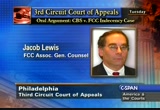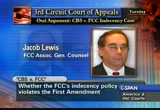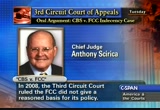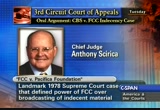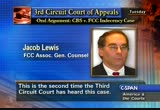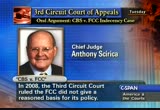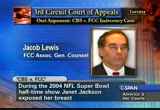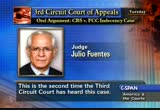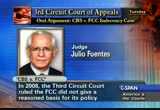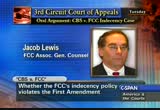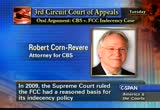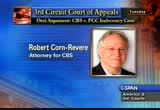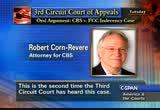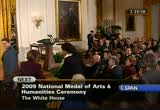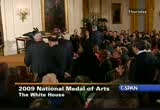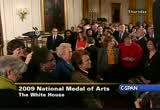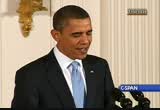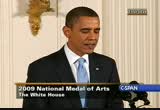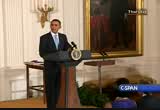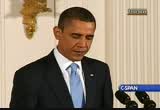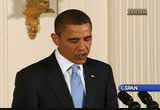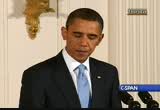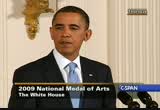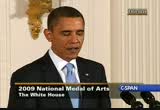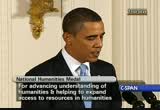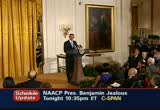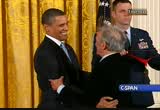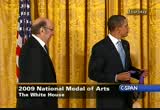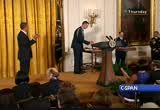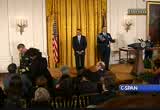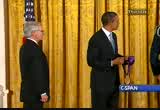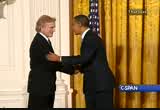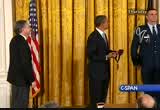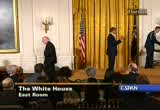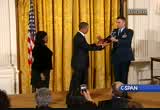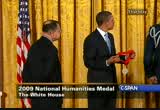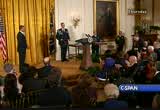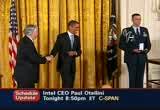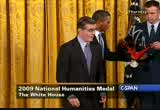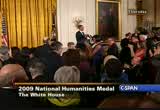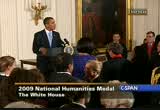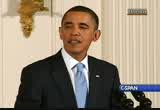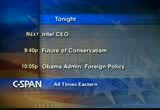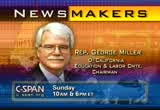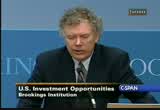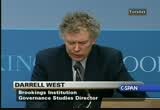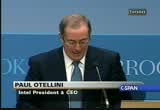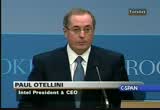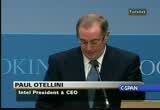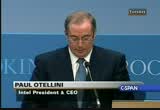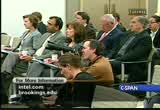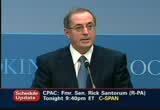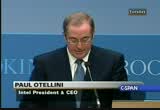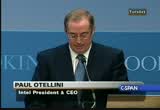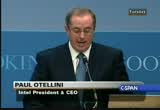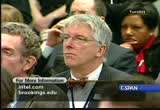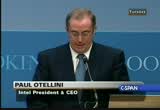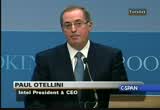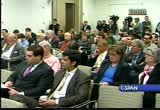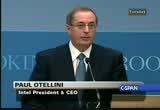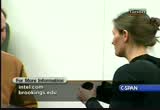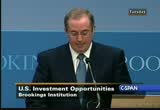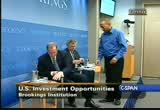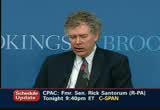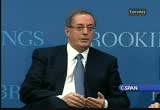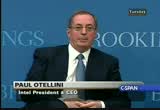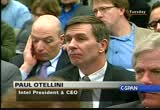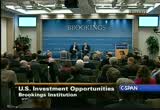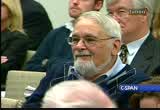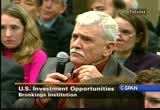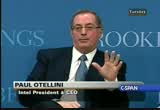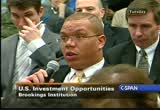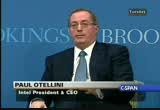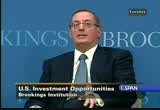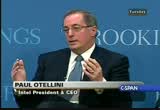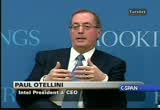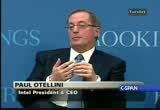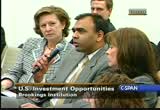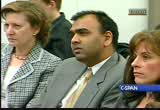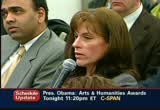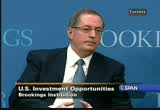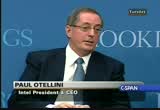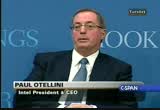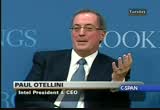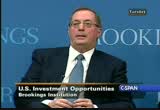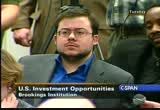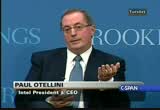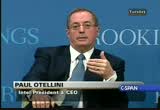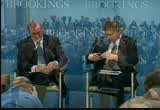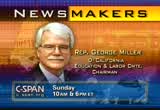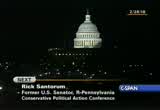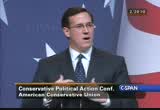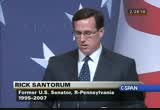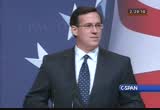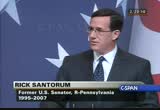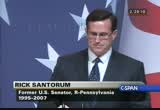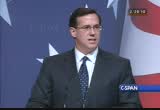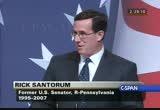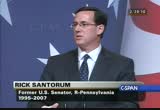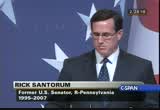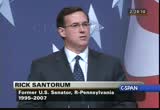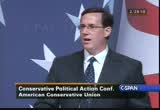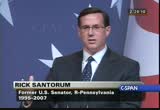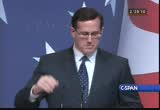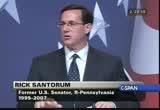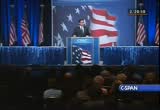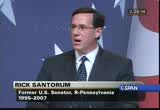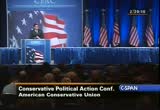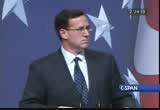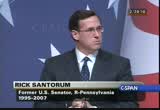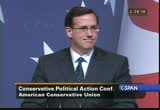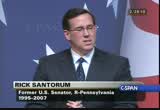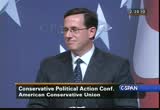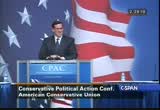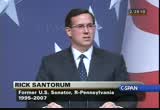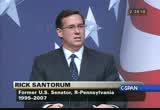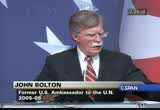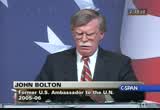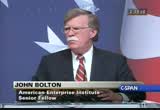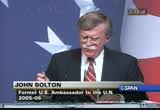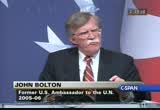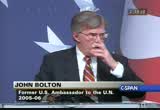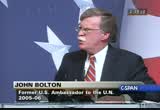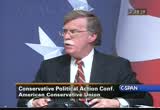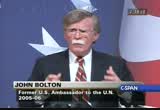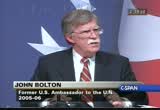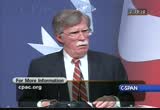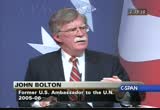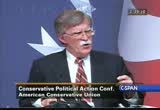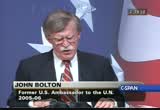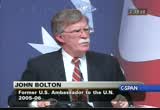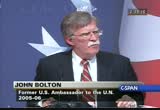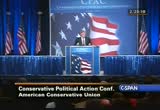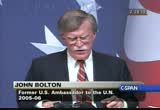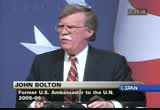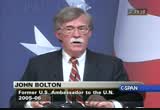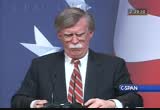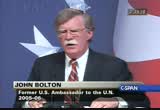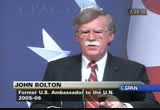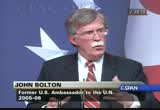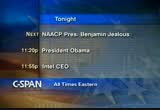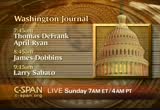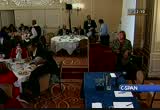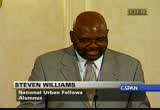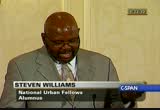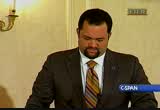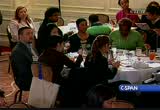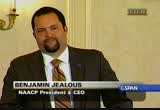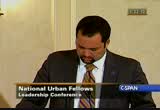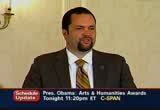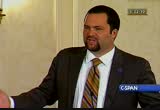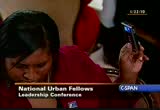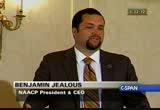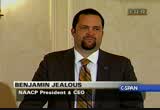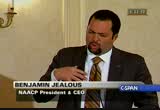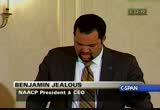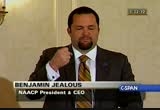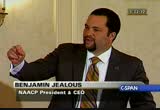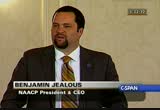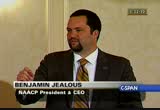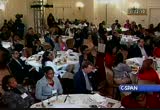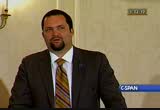tv American Perspectives CSPAN February 27, 2010 8:00pm-11:00pm EST
8:00 pm
it is to mine, implicit that their approach was to take the higher standard and employ it both b and d. >> you want us to adopt that as a standard? >> i think as involves the commission of any act. the commission found the failure was an omission, and this court has also found that recklessness satisfies requirements, if we assume it would have some constitutional means.
8:01 pm
8:02 pm
at that time, presumably cbs would take an appeal. i want to note one thing -- i do not seek of bigness -- the vagueness. >> i thought they raise it initially. let's assume that they did. >> i only wanted to say that i do not think you can make that assumption. they did not make it in their supplemental briefs on the remand. i see cases in the opening brief that are also cited, but i do not see it in the text. if they made it, fine, obviously they cannot continue to press the. what was striking in these
8:03 pm
briefs is that there were no vagueness arguments or anything that stated that the commission authority was unconstitutional. they had other arguments they make. those arguments -- the court does not need to address those arguments. at least not until the other issues have been resolved. >> what is your position on the vagueness? >> as the d.c. circuit recognized -- this is not in our briefs because cbs did not include it. justice ginsburg said with the majority that they looked at the issue and saw the same formulation that they did in
8:04 pm
pacifica and the upheld the decision in bus of a gun. we did not see -- upheld the decision in the pacifica. >> but that application has changed since pacifica. i am not sure you can re.ly -- rely on what the supreme court said. at least you had an exception for fleeting words. >> i think the contextual analysis has not changed. i do not think there is any vagueness, in terms of cbs not been on notice. i do not see as a general manner -- matter or specific
8:05 pm
manner -- i built to see -- fail to see -- again, what if they had scripted this? if they had said it was entirely unclear to us that because she only did it for a second, that would-be -- >> that is another way to deal with the vagueness issue to make the difference between scripted and non-scripted material. >> i think the supreme court upheld this analysis saying that it does not make sense with the contextual analysis to put some material off the table. if the objection is that it is vague, i do not know that the decency analysis is any more clear for the unscripted material versus scripted
8:06 pm
material. they have always found that the fleeting nature of the material is irrelevant. it does not mean it can get passed. the supreme court emphasized contextual analysis in at pacifica -- in the zapata -- in pacifica. i think the argument was closed in pacifica. even though it may not be precisely clear in every case of the decision would come out, it has trumped it. it was meant to give broadcasters an idea of how the commission -- what the commission's remark would be. they were -- what the commission's framework would be.
8:07 pm
there is a body of law extending since that decision which explains -- which helps explain or analyze how the commission does this. it is not a close text. >> there was discussion of young earlier. if that was not scripted, it was pretty close to being scripted. in terms of the fleetingness, compared to this particular case, it would seem they were on different ends of the spectrum. am i correct? >> i think they were both less than a second -- the actual image was less than a second. i do not know that they would agree with the characterization of it being scripted, whereas in
8:08 pm
young there was an attempt to have the performers' performance off-screen. but they were in robes, naked underneath, and i guess nobody figured out, that if you sit under a chair long enough, under hot television lights, the road does not necessarily get up with you. -- the robe does not necessarily get up with you. i do not think they intended for the performers to be exposed. recklessness could be applied in both cases. this could very well happen. cbs had a number of indications that it would have been a very good idea to put a video delay in place here. they pushed the envelope -- the choreographer said there would be shocking moments. well they could not guess precisely what would happen, that is the purpose of having a
8:09 pm
delay. >> we will give you some more time. is there anything else? >> you might have answered this, but i had a concern about the recklessness standard. when you discussed it before, you said that cbs omitted a number of things, as it should have done. you mentioned the delay. i have an understanding of recklessness. they said that they did not care about the risk. that is the kind of recklessness i am bringing about. you are suggesting that if they did not do a, b, or sea, they may be held reckless. -- or c, they may be held reckless. >> they explained that you must take precautions, even if you don't know when there will be nudity displayed.
8:10 pm
you bring together a volatile mix of performances. to ignore warning signs simply because they do not know or are not certain, it is as if somebody put together all whole bunch of situations and then decided to walk away and not get a fire extinguisher. them that it suggests -- >> it suggests to me that because of the people involved that they were aware that something paula todd might occur? but they did identify -- and that's something vala tile -- sets and in bolling tile -- that something volatile might occur? \ >> they did identify something among their concerns.
8:11 pm
they were concerned about whether the visual script would be adhered to. there were questions about how long the video delay would be. it gave people a scary feeling. there were a number of pieces of evidence that should not put cbs on notice. the point is that they do not necessarily have to know for certain that something was going to happen. if they knew for certain something was going to happen, they were under a greater duty to make sure it did not. if there is evidence that they proceeded nonetheless in taking the risk not to take available precautions, it is justified and imposing forfeiture. >> thank you very much.
8:12 pm
mr. corn-revere. thank you, your honor. i would like to make just a few points and answer a few questions you might have. to answer the question that came up earlier about the vagueness argument, the initial pages talk about the nature of the policy and the reply brief also addresses that issue. mr. lewis i think misspoke in his last few minutes on the floor when he talked about questions that came up during the planning of the super bowl in regards to the video delay. there was discussion, as we discussed at length the last time, about imposing an audio
8:13 pm
delay. there was no suggestion of using a video delay, because no such delay had ever been used in the past. i will answer any questions you have. i think it is important to notice how the fcc argument has changed over the course of this case. when it was before you the last time, it argued that the distinguishing between images and words is obvious in policies, but unstated. now, after it has argued the fox case, it's argument is that the policy was stated in 1987, which is not so obvious that they ever sighted in any case until 2006 in a different context. that change in emphasis is critical in understanding how the fcc is involved in the post hoc rationalization. secondly, the sec is wrong when it suggests that the -- the fcc
8:14 pm
is wrong when it suggests that the decision from the 1987 is critical to the decision on the apa. it was not. you can remove that altogether and it would reach the same decision based on analysis. >> is that the test? once we have a grant of richmond, -- grant of remand, do we need to have found that the matter before us is being argued with this central to the decisi, or can we take an opportunity to rethink and change our mind? >> certainly the court had the opportunity to rethink the issue and change its mind. the question is whether the citation of this language goes to the issues that persuaded this court the last time. the public is that the supreme court was simply looking at that
8:15 pm
in a different context and it did not consider weapons -- did not consider whether the other images were implicated. they did not look at the citation of the language and say it was irrelevant. it would instead look at the rationale that the fcc gave in its 2006 omnibus remand order. they tried to argue that the fox broadcast would have been in decent even under its prior policy. it cited the 1987 order and try to argue that it never had a fleeting expletive policy at all. the supreme court reached the decision that it did because it found that there ultimate explanation, where it actually acknowledged the policy, was the vision to survive under analysis. >> mr. lew was pointed out that the language on -- mr. lewis
8:16 pm
pointed out that the language on the oxygen or the court said, in finding the agencies -- on the fox decision where the court said, in finding the agency's decisions were entirely rational -- the court masaid it made no sense to distinguish between liberal and nonliteral uses of the words. does that not support mr. lewis's argument? >> it supports the decision in a box, where it was distinguishing between liberal and nonliteral -- it supports the decision in that box, where it was easing was in between -- it supports the decision in fox, where it was distinguishing between
8:17 pm
literal and nonliteral. you could conclude that an isolated expletive was pandering. it is important to note to the constantly changing factors at play here. mr. lewis has talked about how the george carlin model was nonliteral uses of the word that the fcc and has argued several times that those words were not all nonliteral uses. there are arbitrary in their application -- defining them one way in one case and finding them anin another way in other cases. >> is there anything else you would like to say? >> i feel like sometone being asked for his last words.
8:18 pm
>> this was very well-argued and very well-briefed. we would like to have a transcript made and ask that you share that. please check with the clerk's office. we'll take it under advisement and we cross is cancelled once again. >> please rise -- and we thank you the council once again. >> please rise. ho[captioning performed by national captioning institute] [captions copyright national cable satellite corp. 2010] memo to night on c-span, president obama's -- >> tonight on c-span, the president's remarks.
8:19 pm
paul otellini talks about his thoughts on u.s. tech companies. the former u.s. senator rick santorum talks about the future of conservatism. the former ambassador to the united nations, john bolton, on the obama administration's foreign policy. >> president obama made remarks and presented awards for the 2009 national medal of arts and national humanities metal. some of the honorees include artists and academics. this is 30 minutes. >> ladies and gentlemen, the recipients of the 2009 national medals of the humanities. [applause]
8:21 pm
8:22 pm
thank you, everybody. thank you. thank you. please, have a seat. i am sorry i am a little late. [laughter] i had this thing i had to do. but i understand that people have been drinking and eating the big shrimp around here. i have to say that the weight will have been worth it, because we are honoring an extraordinary group of individuals. before i begin, i want to make a few acknowledgments. first of all, somebody who was with me today and is busy every day on behalf of the american people -- speaker nancy pelosi. [applause]
8:23 pm
we have somebody who has been a great entrepreneur of the arts who we are glad accepted the position of chairman of the nea. please give him a big round of applause. [applause] another individual who had an extraordinary distinguished career in congress and has been a consistent supporter of the arts and humanities and is somebody who does not just talk bipartisanship but has always walked the bipartisan walk -- we are grateful to have him here, mr. jim leach. [applause] there he is. two great friends of mine and the code-chairs of the president's commission on the arts and humanities.
8:24 pm
please stand and let us give you a round of applause. [applause] and two recipients who were not able to be here today, but i want to make mention of them because obviously their careers have helped to mark the landscape of american culture for decades. mr. bob dylan and clint eastwood, who are both recipients but could not make it today. all of us are here to share recognition of the importance of the arts and humanities. pursuits and professions that enriched the mind and the rest the ssoul and strengthen the
8:25 pm
character of this country. they bring a stroy, understanding, it inside, comfort, -- they bring us joy, understanding, in sight -- insight, and comfort. it led to the founding of the national endowment for the arts and the national endowment for the humanities. these institutions play a vital role in enhancing america's cultural legacy. they promote work and cultivates talent and they deserve our gratitude. one of my special produces -- privileges is that i get to take part in ceremonies like this, to honor individuals and citizens we celebrate the triumph of the arts and humanities that bring us closer to an understanding of
8:26 pm
what makes us american and what makes us human. one of the extraordinary features of our cultural ignorance is the dynamism and diversity -- cultural inheritance is the dynamism and diversity. marion anderson, louis armstrong -- it is a culture in which we can all find a place and we can all take great pride in. the men and women we honor today are part of this unique american tradition. in a cultural moment that too often prizes the some days -- the sensational, it is worth recalling the contributions of those in this room that rise above the particular moment in which they are made. with us are actors and
8:27 pm
authors, conductors, curators, collectors, civic leaders, champions of the arts and humanities -- each has taken a different path to get here and made the most of their different gifts. they have all reached the peaks of cultural achievement and are a testament to the breadth and depth of the human spirit. ancient greece and rome are remembered for rulers who conquered the known world, but also for the "odyssey" and "the iliad." europe is remembered for the strings of revolution, but also for the encyclopedia. china is known for its poetry. it is the legacy of
8:28 pm
civilization, how they are remembered. we will be remembered for what we do in our time to deliver progress for our people and advance the dreams of all people. i hope we will be remembered for something else as well. i hope we will be remembered for the metropolitan museum of art, the school of american ballet, for all that you, the honorees, have done to enrich and enhance america's legacy. the legacy will be forged by all of us, doing our part. by those of us in washington doing what needs to be done to improve the lives of people who are -- to we were elected to serve, by brave men and women fighting under our flag. by citizens and neighborhood organizations and places of worship that are giving back to their communities. by scientists advancing what we know about the workings of the universe. and by americans like you -- creators, imaginers,
8:29 pm
entertainers, helping us understand human experience and recognize our common humanity. the task is especially important right now. it is in times like these, with all the talk about what makes us different and divides us and keep us apart, we lose sight of what holds us together. some things speak to all of us. it does not matter whether we're democrats or republicans. we are all profoundly moved by our reflection. no matter what the color of our skin or what our beliefs, we can all draw lessons from the works of history. no matter what community we call our own, we can be moved by sympathy or -- by symphony or an aria, a soprano voice. we can be moved by a film score. the arts and humanities appeal to a certain urine -- a certain
8:30 pm
yearning in all of us. more than 200 years -- more than 225 years ago, and very 18, 1784, george washington sat down -- on february 18, 74, george washington sat down, just before they -- on february 18, 1784, george washington sat down with his colleagues to make a nation indivisible under god. what he sat down to write that day was not about the recent triumph over the british or about what shape america might take. it was a letter to a bookshop. before requesting a few volumes, he expressed a belief, "to
8:31 pm
encourage literature and the arts is the duty which every good citizen goes to his country." so speaks the father of our country. even amid the concerns of those heavy and dangerous days, he took time to reflect on the value of what were then called "the elegant arts." he foresaw the essential role that the arts and humanities would play in the formation of our country's character. if he were with us today, i think he would agree that all of you have fulfilled your duties. you are all good citizens and have enriched the legacy of the united states of america. with that, i now ask the honorees to come up one by one as their citations are read.
8:32 pm
>> the 2009 national humanities medal goes to elie wiesel. [applause] >> the 2009 national humanities medal goes to him or his unwavering commitment to preserving the memory of the holocaust and its victims. he has fostered compassion and understanding through his writing, leadership, and his advocacy for human rights. [applause]
8:33 pm
>> the 2009 national medal of arts recipients -- -- milton gl. -- glazer. [applause] >> it goes to him for a lifetime devoted to improving the way people communicate your innovation in graphic design and for memorable visual effects that challenge in denver rate artist and the like all americans. -- that challenged contemporary artists and delight all americans. [applause] >> maya lin. [applause]
8:34 pm
>> the 2009 national medal of arts goes to her for her profound work as an architect, artist, an environmentalist. her vision for the national vietnam veterans memorial emphasizes her deep understanding of the ways in which we respond to the world around us. [applause] >> rita moreno. [applause] [laughter] >> the national medal of arts goes to her for her remarkable
8:35 pm
achievement on stage and screen. her performances have served as touchstones for millions of americans for whom she reflects their own passions, troubles, and joys. [applause] >> jessye norman. [applause] >> the 2009 national medal of arts goes to him for his contribution to -- for her -- goes to her for her contributions to a range of voice and its warmth and intensity. [applause]
8:36 pm
>> accepting for the oberlin conservatory of music. [applause] member of the 2009 national medal of arts goes to the conservatory -- >> the 2009 national medal of arts goes to the conservatory for preparing young musicians to become contributors as a model of music education. it proves that exceptional training in rich's artists, our communities, and our nation. -- and reaches -- enriches artists, our communities, and our nation.
8:37 pm
8:38 pm
>> the 2009 national medal of arts goes to the school of american ballet for shaping the history of 20th-century dance by training young dancers under the guidance of the masters. [applause] >> frank stella. [applause] the 2009 national medal of arts goes to frank stella for his accomplishments as one of the world's most innovative painters and sculptors. his experiments often transcend
8:39 pm
the boundaries between painting, printmaking, and scoping, creating -- and sculpting, creating modern masterpieces. [applause] >> michael tilson thomas. [applause] the 2009 national medal of arts goes to him for his dedication to elevating american orchestral playing as a renowned conductor and for his commitment to engaging new artists and audiences in the exciting world of contemporary music. [applause] >> john williams. [applause]
8:40 pm
the 2009 national medal of arts goes to jon williams for his -- john williwams -- john williams. he has inspired moviegoers for decades. [applause] >> the 2009 national humanities medal recipient, robert a. caro. [applause] >> it goes to him for capturing the subtle machinations of political influence in america. his biographies of robert moses
8:41 pm
and president johnson have shown how individuals accumulate an exercise power in local and national settings. [applause] >> annette gordon-reed. [applause] the 2009 national humanities medal goes to her for important and innovative research about an american family. her narrative story brings to light a previously unrecognized chapter in the american story. [applause]
8:42 pm
>> david levering lewis. [applause] the 2009 national humanities medal goes to him for his insightful examination of w. e. b. dubois, an early islamic- christian relations in europe, which have enriched our understanding of the forces that shape world history. [applause] >> william h. mcneill. [applause]
8:43 pm
>> this is difficult. >> the 2009 national humanities medal goes to him for his pedagogy at the university of chicago and as an author of more than 20 books, including "the rise of the west." it raised simulations -- civilizations through five dozen years of history. -- through 5000 years of history. [applause] >> oh, you.
8:44 pm
[unintelligible] [laughter] [applause] >> philippe de montebello. [applause] the 2009 national humanities medal goes to him for his vision in bringing great art to an international public and his leadership in revitalizing the metropolitan museum of art, an for fostering art appreciation among people of all ages. [applause]
8:45 pm
>> accepting for albert h. small, robert. [applause] member of the 2009 national humanities medal goes to him for his devotion to sharing early american manuscripts with our nation's cultural institutions as a philanthropist and collector. his generosity as gulf educate countless americans about those who founded our country -- has helped educate countless americans of all those who founded our country. [applause]
8:46 pm
>> theodore c. sorensen. [applause] >> the 2009 national humanities medal goes to him for advancing our understanding of modern american politics, as a speech writer and adviser to president kennedy. he helped craft messages and policies and gave us a window into the people and events that made history. [applause]
8:47 pm
[applause] >> ladies and gentlemen, please give a big round of applause to all of the honorees. [applause] [applause] >> ladies and gentlemen, that concludes the formal program, but there are some drinks and big shrimp left. [laughter] we expect you to enjoy the hospitality of the white house. we want to personally say what an honor it has been for us to
8:48 pm
be here at the ceremony. each and every one of these individuals has in some way touched my life. i think about caro and reading "the pair or broker -- "the power broker" and being memorized -- being mesmerized. i think about maya lin, and the first time i saw that extraordinary monument to the courage of our young men and women in uniform. i think about when i first heard jessye norman's voice or saw rita in "west side story." i think about the extraordinary work may have done and the
8:49 pm
speech writer who used up all the good words for presidents. frank stella who is a legend. each and every one of you have in some way touched our lives. a personal thanks from michelle and myself. i hope you have a wonderful evening and continue to enrich the lives of our citizens. it is extraordinarily important and we will continue to be as big a booster as possible from this office. thank you very much. [applause] ♪ coming up, the ceo of intel,
8:50 pm
paul otellini on his latest investments. following that, a couple of programs from last week's annual political action conference. rick santorum talks about the future of conservatism. john bolton talks about obama's foreign-policy. >> tomorrow on ""washington journal," a look at the latest developments in 2010 with thomas defrank and april ryan. we will chat with a special envoy to afghanistan on the latest in that region.
8:51 pm
following that, we will discuss the latest on the economy. that is live at 7:00 a.m. eastern on c-span. tomorrow on "newsmakers," george miller looks at the status of health care legislation. the german -- chairman also talks about student loan bills. that is at 10:00 a.m. eastern here on c-span. >> i come from latin america. i was not expecting to find this kind of poverty. >> photographer and documentary filmmaker kike arnal. sunday on c-span. >> the seale of chipmaker intel -- ceo of chipmaker intel
8:52 pm
announced that he would buy billions of dollars of u.s. high-tech companies over the next couple of years. here is a look at his speech, just under an hour. >> good morning, i am the vice- president of the brookings institution and i welcome you to this event on rebuilding the foundations of american growth. the last year and a half have been challenging times for everyone. we have suffered through our biggest economic recession since the great depression. that recession is officially over, but we continue to have high unemployment and there remains considerable public anxiety about the future. along with these issues, the united states faces serious long-term challenges, in terms of its overall competitiveness. we have difficulty training and
8:53 pm
recruiting our next generation of scientists and engineers. we need to maintain our excellence in innovation that has propelled our nation's past economic growth and we need public policy that enhances our long-term competitiveness. to help develop a better understanding of these important issues, we are pleased to welcome mr. paul otellini, the president and ceo of intel. it is a company that needs no introduction. it does not mean i will not provide one. it has the ninth most viable brand in the world. it makes microchips that power more than 80% of the world's personal computers as well as thousands of other electronic devices. during its history, the company has been guided by america's leading business minds, including the company co- founders. today's speaker is the latest in a long line of outstanding leaders. he grew up in severance is go, received his undergraduate
8:54 pm
degree at the university of sampras's go -- he grew up in san francisco, received his undergraduate degree at the university of san francisco. in 2005, he became the company's fifth ceo. he has provided strong and dynamic leadership, refocus the company's efforts to innovate and grow beyond the personal computer, and led the company in becoming cost-competitive in the markets, developing new products and adding new customers who are driving their current growth. the in his remarks today, he will share his thoughts on the need -- in his remarks today, he will share his thoughts on the need to create new business and industry. he will discuss what we need to do to help our mentation -- our
8:55 pm
nation maintain a globally competitive economy. please join me in welcoming mr. paul otellini to the brookings institution. [applause] >> thank you and good morning. with an introduction like that, you can go on for as long as you would like. i want to begin by thanking you for hosting us here today. it was one year ago this week that i came to washington and announced in my company would make a $7 billion investment in our u.s.-based manufacturing plants, specific -- specifically targeted to the most significant technology we have ever invented. you will recall that when i made the announcement, the u.s. economy was facing one of the greatest crises in our history. i call it the worst economy i have seen in my 35 years at
8:56 pm
intel, yet i believe our investment was good for our company and our country. it was a way to increase our commitment to innovation in future competitiveness. as it turned out, america and the world avoided the worst case economic scenarios. we're not out of the woods. i am concerned that we're not taking all the right steps as a nation to ensure that our economy is on the long-term trajectory of growth and leadership. we face a world with much tougher competitors, many of whom are excelling their investment in the future faster than we are. -- accelerating their investment in the future faster than we are. i would like to provide an update on the investment that i announced last year and share some thoughts on what else business and government should be doing. it is what we must do to create
8:57 pm
a globally competitive economy. let me start with the investment we made in our stated the art -- in our state-of-the-art manufacturing plants. we have two plants in oregon producing the chips. our factories in arizona and new mexico will be in production later this year. these factories are making tiny electronic systems in betted on a silicon chip, roughly the size of your fingernail. to give you a sense of how far the technology has progressed, it is worth comparing these microprocessors to the very first one we produced in 1971. the earliest ones contained about 2300 transistors. the ones we are producing today routinely include more than 1 billion transistors. as a result, they are far more capable, enabling faster computers, the most advanced consumer electronic devices,
8:58 pm
sophisticated imaging for medical care, the brains inside the next generation of robotics, and thousands of other applications. they do all of this while consuming far less energy than their predecessors. we believe these are the most dynamic platform for innovation that our country has -- that our company has ever produced. our investment in u.s. factories producing these ships was not a one time gesture. we invest money all over the world. 75% of our sales come from outside of the u.s. 75% of our manufacturing and our r&d spending continues to be concentrated inside the u.s. we attract some of the most talented scientists and engineers from around the world. just last year, we invested more than $5 billion on r&d in areas that span from the exploration of new materials to create even smaller transistors, to products
8:59 pm
that we believe will transform the way that health care is delivered, to future technologies that involve augmented reality, and computing that responds to human gestures. these are long-term investments for us. much of what we were on today will not drive meaningful business results for five or 10 years. in the competitive, innovative industry, this is what you must do. there is no guarantee that the u.s. will receive all of this investment in the future. we need to address the fact that government policies can create disincentives to investing in america and the trend here is or some -- is worrisome. global competitiveness requires making investments for the future. we must invest in things that make innovation possible, even if they did not yield immediate results.
9:00 pm
unfortunately, long-term investments in education, research, digital technology, and human capital have been steadily declining in the united states. so too as the commitment to policies that made this such an entrepreneur ial power house for more than a century. this is the bitter truth, but we do not hear much about it. at one time, we could boast about having the best students in math, science, and engineering. our research centers without peer. we seemed a generation ahead of the rest of the world. that simply is no longer the case. over the past decade, our competitors have focused on the very things that made at americas integrated economy the strongest in the world -- america's innovated economy the
9:01 pm
9:02 pm
economic performance and so on. on this scale, the u.s. was ranked dead last out of the same 40 nations. the news may sound shocking, but it shouldn't be. when you take a hard look at the things that make any country competitive, it becomes clear that we are slipping. consider the credit that we give to businesses that invest in r and d. they were once the most generous in the world. today companies find their r an d investments more valued and more rewarded by many other countries. or think about our ability to win the global war for talent. our immigration policies seem deliberately designed to prevent us from attracting the best minds in the world. american companies are giving a tiny allotment for visas for
9:03 pm
foreign-born engineers and scientists. last year the quotas for those with advanced degrees was completely filled by april. with such policies, are we surprised that more and more top-performing students return to their home countries after studying in our graduate schools. then there are taxes. at a time when countries in europe and asia are clamoring to offer companies like intel to build factories, the tax incentives here are few. our combined state and federal corporate tax is the second highest in the world. economists at the eocd tell us it's precisely these high statutory corporate rates that punish the most dynamic and innovative firms. lastly, we have significant uncertainty relative to the future costs that businesses may incur in the areas of health care and energy costs.
9:04 pm
on all of these issues, there may be legitimate policy differences, but as a nation, we must have a clear enduring strategy to promote innovation, investment, and start-up companies, a set of policies that let american businesses confidently invest in the future, raise capital, take risks, and feel assured that we are training the talent to lead to the next generation of industries. that after all, is what the rest of the world is doing. over the next three years, for example, china, india, and south korea will invest three times the amount that we do in clean energy technologies. taiwan has made itself into an i.t. giant because of sound long-term planning. after the asian financial crisis of the 1990's, taiwan used the opportunity to invest in i.t. just as korea and japan were cutting back their spending. today the country is the
9:05 pm
undisputed center for p.c. design and intervention, exporting the computers it builds to the rest of the world. then there is india. this country has put in place an aggressive program working with several companies including intel to enable a half a billion internet users and 100 million broadband connections by 2012, two years from now. meanwhile, the country that invented the internet, that's us, has been slow to develop our own national broadband strategy. the countries of europe, asia, latin america, and before long the middle east, are going to be competing with us in every spear of the economy in the years ahead. if you want to stay with them and remain a vibrant growth economy, we have to recommit to a strategy that drives the economic growth of the future. let me be clear. after the financial crisis short-term measures were a necessary part of economic
9:06 pm
policy. the stimulus package passed by congress last year, for example, undoubtedly steered the economy away from much more serious problems. my biggest concern, though, is that so much of the spending is targeted to occur in 2011 and 2012, well after most people believe that the crisis will have passed. other countries, most mostly china, manage to put stimulus funds to work much faster and are benefiting from that today. but stimulus spending is not a substitute for forward-looking investments that help create the underpinnings of economic growth. and perhaps the most important of those is education, an area in which international test scores continually tell us we are failing to be competitive. but it doesn't have to remain like that. this is an area of particular interest to me. our business, after all, depends on a pipeline of highly skilled people to help us discover subsequent generations
9:07 pm
of innovation. i'm very proud to tell you that over the last decade, intel has invested nearly $1 billion in education around the world, especially in the areas of math and science education. our goal has been to create the innovation capacity for the future by preparing teachers to integrate technology into the classrooms and the learn processes. our intel teach program has already trained more than 7 million teachers world wild and more than 350,000 in the united states. the result is improved critical thinking, research, and problem solving skills that students need to succeed in the jobs of the future. we see this as a vital investment in the next innovators, thinkers, scientists builders and entrepreneurs. this is an area where the u.s. must succeed. growth in math-intensive science and engineers jobs
9:08 pm
outpace overall job growth by three to one. think about this. according to one source, america's g.d.p. would grow by more than 1/3 if u.s. students became globally competitive in math and science. any real strategy for future competitiveness has to address this issue. president obama has made this issue a top focus for his administration. we see it as a responsibility of not just government, but of every business that depends on highly skilled employees. by the way, if you want to be inspired by what america's young people have to offer, please join us here in d.c. on march 16 to celebrate the best and brightest as 40 of america's top young scientists display their projects and vie for more than $1 million in scholarships at the intel science and talent search. this is one way that we shine a light on what is possible to inspire others to achieve.
9:09 pm
i have talked a lot about how government can partner with business and how it can establish the strongest incentives for investment. let me also make clear that there are things that businesses must do. in fact, ought to do regardless of what government achieves. today i want to talk about two specific initiatives that i hope will raise the bar for all companies that want to make a difference and invest in the future. the first is to create jobs immediately for college students, especially majors in engineering and computer science. this is an innings dispenseable resource for the -- indispensionable resource for the united states and the in the current climate, there hasn't been enough hiring interest for these people. in the last several weeks, i have spoken with c.e.o.'s of companies to make sure we put this resource work. i'm proud to announce that
9:10 pm
accenture, broadcom, c.d.y., dell, e-bay, e.m.c., g.e., google, h.p., liberty mutual, marvel, microsoft, and yahoo! have all committed to join intel in increasing their college graduate hiring in the united states this year. most of them will join us in at least doubling our college graduate hiring leading to a total of over 10,500 new jobs from just these 17 companies that i mentioned. and these jobs will help an annual payroll including benefits of over $1 billion a year. collectively, this is a bet on america's next generation of innovators. we cannot afford to let our future scientists and i think nears sit idle after graduation. the second announcement i would like to make looks even further
9:11 pm
into the future. i'm pleased to nouns in the invest in america alliance, a group of leading b.c. companies committed to steer investments into technologies that will drive economic growth and job characters in the united states. the members of this alliance have committed to invest $3.5 billion in promising clean technology, information technology, and biotechnology, companies over approximately the next two years. as part of the alliance, intel capital will participate with its own $200 million commitment. intel has worked with 24 leading venture capital firms to join us with their own commitments in support of this alliance including advanced technology ventures, bramar energy ventures, d.c.m., draper fisher, fly wheel ventures, good energies, institutional venture partners, invest corp.
9:12 pm
technology partners, new enterprise associates, north bridge venture partners, west mark partners, seven rosen funds, storm ventures, telesoft partners, updata partners, u.s. venture partners and walden international. those are the leading venture capital firms in the world coming together to commit $3.5 billion to u.s. investments. i believe that together our commitments to seeding the ground with start-up capital will prove to be a very rewarding investment for both the companies that contribute and for the competitiveness of the united states. and since venture-backed companies in the u.s. accounted for more than 12 million jobs or 11% of the total private sector employment in 2008, these investments will also help drive job growth in the u.s. now and in the future.
9:13 pm
i would like to conclude on an optimistic note. a year ago we were focused on avoiding economic calamity. today we need to start focusing on the future. that future is going to be more demanding, more competitive, and, frankly, more disruptive to american business. but those conditions as anyone who has ever worked in silicone valley knows, can be exactly the right environment for new thinking and breakthrough innovations. that is why fostering such an environment ought to be the essential characteristic of our economic policy and the plans of every competitive business. i hope my thoughts today can help create a common ground between business and government, a shared vision that allows us to start focusing on the future, not just the crisis of the day. all of my life i believed that
9:14 pm
america's best years are still ahead of it. if we focus, invest, and work hard, that belief will hold true. thank you. [applause] >> first of all, i thank you very much for those comments and that leadership. i mean, especially, the two new initiatives that were announced today creating 10,500 jobs is terrific given the state of our country's high unemployment and then also investing in america, the lines that you're creating. it certainly is a bold new
9:15 pm
venture. and at the very end of your talk, you mentioned the importance of focusing on the future and that we need to create an environment for new thinking. and i was reminded that last february, you gave a speech at the washington, d.c. economics club and you said that you thought the economic crisis represented an opportunity for institutions to look at themselves and to think about how to reshape things and how to behave in a different way. ok. now it's a year later. how would you assess the job that our institutions are doing, both in terms of business institutions as well as political ones? have they risen to the challenge? are they making the types of changes that you thought were necessary a year ago? >> with a few exceptions, no. i think you have seen some companies make some big bets on the future and try and change direction. i'm point out shoutout g.e. is a notable example of it, a
9:16 pm
gigantic company a 100-year-old company that is trying to change itself and trying to retool itself while it can. most companies, most people don't change until they have to. intel had the ability to change in 2006, 2007, and 2008 before the recession hit because we thought the business of the future would be different than the business of the past. going into the recession, we were already restructured. we had the luxury of going through the recession mostly intact. i think other companies had to make pretty drastic changes, cutbacks and so forth. i don't think they have come out of it rethinking yet where they want to be or where their businesses will be with a few exceptions like g.e. i can extend that to the banks. it's not clear there is anything different today than there was five years ago, and yet these institutions are more necessary today to our society and our economy than they have ever been. >> and in terms of our political institutions, i mean, you had several pointed
9:17 pm
compents comparing the united states to other countries and other countries kind of stepping up, doing their stimulus package and investing the funds more rapidly. how would you rate the job congress and the president have done? >> oh, boy. >> now is when you get in trouble. >> pretty poor. i think it's been a series of endless compromises and debates at a time when action is needed . i was in europe last week and i met with the finance minister of france. and for many, many years, france was a place that you didn't think about as a place you would do investments. the 35-hour a week and the social welfare state and those kinds of things, they have changed and they have changed in the last few years, primarily under sarkozy. christina tells me france now
9:18 pm
offers a 50% credit on r and d against maybe a 20% credit in the united states that sometimes may go away. so you are thinking about hiring an engineer, where would you hire that engineer? in california or in toulouse? almost half the price. i think you have to think about these things. while other countries are making hard decisions on attracting investments, we're debating earmarks. >> but yet you seem very optimistic about the long-term future of the u.s.a., you're forming this fund to invest in america. what's the basis of your optimism there? >> you're entrepreneurial zeal is second to none. our education at the graduate school levels, particularly in math and science andening nearing is second to none. i don't see that changing. the best and the brightest go to our schools. if we could capture that and
9:19 pm
channel it into our companies and start-ups, that cycle will repeat itself, independent of sort of short-term innovations. >> why don't we open the floor to questions from our audience. we have someone with microphones right there on the aisle. we'll start here. if you can give your name and your organization. keep your questions brief just so we can get to as many people as possible. >> i'm fred alton and i'm retired from i.m.h. my question is -- seeing that you're competing in the united states against countries that provide health care and the companies don't have to do it, how important is passing health care to making rapid progress? >> well, all of intel's employees get health care and it's all paid for eventually by the employers. even if countries where they provide it, you pay a salary, it goes into the tax system and gets paid.
9:20 pm
from that perspective at the employee level, i don't see a difference. and our employees will remain covered whether they're here or someplace else. the health care question that is on debate, i think right now, it's not one that is -- my only concern as a businessman is are we doing something which will significantly increase the costs or decrease the benefits to my employees? and some of the proposals, at least one of the proposals that is going through theoserizer now would tax some of the plans we offer our employees at a pretty hefty right. that means they would pay more money for less benefits. that's not good. >> right behind that gentleman is another question. >> frank manheim, george mason university. >> i recently have done a comparative study of u.s. and europe and here i find the watch world is innovation, but there seems to also be a
9:21 pm
stigma. when i was a grad student in the sciences, most of the grads automatically went to industry. now the greatest outlet for science seems to be university writing peer-reviewed papers. and part of that seems to be because of the theme that industry or manufacturing is a thing of the past in the united states. could you comment on whether the climate in many respects in the u.s. is hostile to manufacturing and industry? >> well, i think those are two different questions. let me deal with the graduate student first and then talk about the climate. i haven't seen your observation in practice. intel has 4,000 p.h.d.'s on the payroll, principally in the united states. i'm on the board of google. i watch who they hire each year. i have friends at microsoft and the other high-tech companies. we are still incredibly large
9:22 pm
employers of exactly the people that you say are competing to write peer reviews. if you want to go into ack damia, that's a -- academia, that's a choice. if these students want jobs in research and development, there are plenty available and there are 10,000 more as of today. >> what about the rest of the country? >> well, that's a third question. maybe we'll defer that one. on the climate for manufacturing, it is tough and that was my comment today. when i look at building a new fact rirks a new semiconductor factory which costs about $4.5 billion, the cost of putting that factory in the united states versus not is an extra billion dollars for me it's not low-cost labor. it is the difference in r and d credit, capital equipment credits, tax credits and those type of things and you get access to local markets. so we're continuing to invest
9:23 pm
in the united states, but the cost, the opportunity cost of these decisions is getting larger and larger as we do nothing. >> right here. >> michael, the joint economic committee. one of the things that we're seeing in the employment data is that there is a concern about the long-term unemployed, those that have been unemployed for six months or more. i think that's more than 40% of the total unemployed and then when you get to a year or longer, that's like half of the 40%, so about 20% or so. i guess two questions -- number one, what exactly is the source of this concern? what exactly is the source of this, is it stigma? number two, as a tech company, what then are some of the policy actions that we ought to be thinking about in order to actually break the -- >> i have no idea what the source is, not being the study
9:24 pm
and one of those people. >> studies or data. >> i don't know why they are chronically unemployed. i don't see a stigma. someone is qualified for a job that's applying at intel, we'll hire them. i lost the second part of the question. >> how do you break the back of it? >> when i was putting my thoughts together for this speech, we looked at a third initiative which was what if we got the tech industry to get together on retraining and maybe grab some of these people that are cronly unemployed and put them through retraining processes that would make them qualified to work in high-tech today. and as i looked at that, i found there was so many preexisting programs in that area, both public and private, that we frankly couldn't add anything new to that stew. it seems to already being addressed by a variety of bodies. our thinking was to do something new and innovative that wasn't being addressed at
9:25 pm
this point in time. >> there is a question right there. >> michael, consortium for policies and incomes. innovation ultimately comes down to one person having an idea. what makes these people different from the rest of us and how can our educational infrastructure and business climate support these people? >> i think that's too narrow a definition of innovation. i think there is often -- there is that light bulb idea that one person has which is the thing you described. and i do the united states is good at that and the track record of the united states says we have the majority of the light-popping ideas for the last 100 years. in a company like intel, though, innovation is not a one-person deal. the products we make are so
9:26 pm
complex. a new generation of silicone technology takes us four years to development. there is probably 2,000 engineers working on it, $1 billion of r and d goes into it. you're inventing new materials to be used, new structures, new equipment. it's a process of collaborative innovation that to me has the sustainable breakthroughs that are able to advance science. that used to be done in the bell labs of the world. now it's done in the intel labs of the world or the microsoft labs of the world. that is not often as one person as legend would have it. >> in the back there was a question. right there. dan o'conner, ccia. i wonder if i could get mr. otellini's thoughts on the patent system and how the patent reform going through congress and patents playing a critical role in the i.t.
9:27 pm
industry, there is a lot of talk of how it's hurting or harming, depending which side you're on, high-tech innovation. i wonder if you're in the field and get your thoughts on how that is affecting your company. >> i agree, if it isn't broken, it's pretty darn close to broken. there is at least two layers of things that i think need to be addressed. one is the process itself. the technology as gotten, in terms of what is being patented in our industry or biotechnical and so forth to have examiners understand the invention and the narrowness and the breadth of it in a timely fashion is something which is simply problematic and underfunded. to me, the patent office needs a substantial change in its funding mechanisms to be able to get proper review in a timely fashion. so that's one end of the spectrum. the other end of the spectrum is once something gets through
9:28 pm
that process and becomes a patent, it is increasingly the use of patents isn't to protect the inventor, but it's to attack somebody else because of the process of creating these patents. so patent reform in terms of the litigation areas is really what our prime interest is here. and you have got four subsequent sis that don't always -- -- companies that don't always have the same function. weave across all of those is the notion of patent trolls who buy a patent and sue a rich company, usually in the eastern district of texas. that has gotten totally out of hand. i think we had good progress on getting consensus bill agreed last year and it seems to have gone into suspended animation right now. we're hoping that it gets
9:29 pm
revitalized this year. it's a good chance to get it done, good time to get it done and stop some of the nonsense here. in the meanwhile, the administration is funding the first part of the problem more aggressively. >> here in the front row with a question. >> to talk about the stem education, math and science education that you were discussing, what do you think is needed? is it more money? is it a reform of the system? how can business change the success that we get out of the dollars that we spend? >> well, i think it's accountability. it's involvement. it's reward systems. it's incentives. it is better teachers. i forget the exact statistic but the number of math teachers in this country that were trained to teach math is well under 50%. it may be 30%.
9:30 pm
it's a low number. to me, the only way you can stimulate kids, particularly girls in math and science is to have a math teacher that inspires then. we lose girls at an alarming rate out of math and science in the fourth grade. and we lose boys in high school. so we need to figure out a way to get better teachers in their first and incentives. one thing that china does -- i don't want to use them as a paragon here -- when they run the nationwide science talent contest that they have in terms of the science fairs, the top 10% get instant admission into any college they want. i don't know what the right model is, but something that says you're in the top 1% of science fair participants in the united states, you can get into any college you want. forget this admissions process. wouldn't that be a nice incentive to put people into the mode of investing in math
9:31 pm
and science. there are a lot of little things. there has to be pull on the other side. we have to make sure there are jobs, well-paid jobs when the kids get out of college that they can find a home. >> hi, i'm julie. i want to piggyback on that question. when you talk about the teachers that you're training to go out and teach stem, are they -- what level are they, high school, middle school? >> k through 12. >> what i'm finding are most of the programs are focused on high school. the gates foundation is primarily high school and it's a little too late by then. >> i agree. that's why we do a lot of stuff in the elementary school. there is a disparity between those numbers. 7 million worldwide, 350,000 in the united states when we started here. i think that disparity itself is alarming. it's not like we're deliberately training overseas. there are significant impediments here that are imposed by the school
9:32 pm
districts, the teachers unions and those kinds of things that are different than what you see in other countries. china says, great, we want all of our teachers trained, 6 million teachers, go get them trained. we have north of 2 million trained already. they make it as imperative. >> right over here is a question. >> my name is stephanie sheridan, i'm a graduate student at johns hopkins. i had a question about the risk climate, i guess within r and d now and how you would say that the last couple of years, given the financial crisis has impacted the risk climate within r and d and how that might affect future progress. >> well, very few tech companies -- i'm trying to think of any -- cut their r and d that i can recall of any measurable number.
9:33 pm
so if you consider that the economic crisis that cuts the money which cuts your seed corn, i really haven't seen that in our industry. i have read about it in some of the biotechnical. that's mostly a function of the consolidation of that industry. so their eliminating redown dancies and inefficiencies. i do think that prior to this year's budget, there was an issue relative to the funding of the big national resource organizations. i think they doubled it in this year's budget again, that's a good start. i think we're up to 2%. >> right there. >> i'm with oracle. you made a comment about some of these other countries. what i have noticed that culturally, the parents encourage their children much earlier in their lives so the government and the education are enablers, but there is a lot of encouragement. what do you think the parents' role should be here in terms of
9:34 pm
providing that encouragement for getting students to go into those fields and "make those fields cool? >> the role ought to be exactly the same. the problem is the role models are less and it's easy, i think even wind the clock back to the 1950's and 1960's here particularly with some of the big programs like put a man on the moon. science was cool. technology was cool. math was cool. geek -- pregeek geekdom was cool. and i think that really generated much of our modern -- well, today as a country. and that model was not unknown by or unwatched by the rest of the world. so you see china, india, brazil, to a lesser extent russia, trying to emulate that now.
9:35 pm
by the way, all we did was emulate what the british did before 1900. they just did it in a different industry. we did it with our industries. so i think part of it is there has to be some degree of pull, these are where the good jobs are going to be. it's with a bit of irony that i watched the great math guys coming out of the schools who were all going to wall street coming back looking for jobs at companies like yours and mine and i think that's great. the fact that you can now recruit some of the best and the brightest and they aren't going to go out and create some derivative. maybe they'll create some real value for the world. >> now you're making news. we have time just for a couple more questions in the background aisle. >> my question, i think that
9:36 pm
there is only so much that companies can do like or kl, microsoft, intel, so like because of the credit crunch, i was thinking is there a way that it could be a public-private partnership where the government can simulate entrepreneurs by maybe creating a competitive form like the venture capitalists do? i don't see that particular problem on start-ups and here is $3.5 billion, if you have a great idea, people in this audience are happy to write you a check. so i don't think the credit crunch on the v.c. side, there is a lot more c.v. money waiting to be invested today on the sidelines than we have had in a decade probably. the idea that the government would get in the middle of our decisions on which companies to fund to me is probably not the best use of government.
9:37 pm
i don't think -- that would not be something i would support right now. >> actually, there is one more question right in front of you. i just want to get to one more person. >> ryan roddio with the competitive institute. high-tech firms including intel have been the target of -- is it in need of reform? >> i think it is in need of reform in the sense that there are reformers in europe and perhaps in some of the agencies here in washington that are behind the curve on what makes technology tick. i mean, the heart of technology for 50 years has been around the law of increasing returns around standards. and when a company has an invention around a standard, they ought to be able to reap the awards of that considering
9:38 pm
that they compete fairly. there is a growing sentiment, certainly in europe, where that is unfair and wrong and you need to protect competitors as opposed to protecting compures. the old u.s. view which is d.o.j. view of protecting consumers ought to be the ultimate test. the consumers getting better product at lower prices year after year, the system works. and if he is not, then something out to be done differently. i think that the old laws are not yet caught up to where technology is and where it's going. >> ok, i guess we have time for just one more question right here. the gentleman with his hand up there. >> i'm jim walker, i'm retired right now. when i was in senior management, i used things like
9:39 pm
preparing presentations and doing research projects and things that i read are now being sent to india and researched to china and taiwan. how does that effect our short and long term development of junior management into senior management? >> gosh, i haven't seen that trend. we use around the world, mostly u.s.-based training. most of it is developed ourselves. our latest training is actually out of the university of virginia that we're putting the top 1,000 people through. so i haven't seen the outsourcing of thought around management leadership and management training. i'll see tom at lunch. i'll ask him. i haven't seen this. >> ok, we're out of time. i know we have a number of journalists here. if you have additional questions for mr. otellini, we have set up a space in the room
9:40 pm
which is the next auditorium over in this direction. so paul will join you over there in a few minutes and we would be happy to answer additional questions that you may have. i want to thank paul for sharing his thoughts, for the leadership that you're developing in terms of job creation and investing in america. we really appreciate you coming to brookings to join us. [applause] [captioning performed by national captioning institute] [captions copyright national cable satellite corp. 2010] >> coming up, a couple programs from last week's annual conservative political action conference. first former u.s. senator rick santorum on the future of conservatism. after that former u.s. ambassador to the u.n., john bolton, on the obama's administration foreign policy. following that, naacp president and c.e.o. benjamin jealous on
9:41 pm
creating opportunities for minorities. >> tomorrow on newsmakers, represent george miller looks at the status of health care legislation among democrats and republicans. the chairman of the education and labor committee also talks about student loan bills. that's at 10:00 a.m. eastern here on c-span. tomorrow on c-span, a replay of the entire white house health care summit. we'll hear opening comments from the president and congressional leaders followed by discussions on health care costs, insurance reforms, deficit reduction and expanding coverage. it starts 10:30 a.m. eastern on c-span. >> the new c-span video library is a digital archive of c-span programming from barack obama to ronald reagan and everyone
9:42 pm
in-between. over 157,000 hours of c-span video now available to you. it's fast and free. try it out at c-span video.org. >> next a couple of programs from last week's annual conservative political action conference. first remarks from former u.s. senator rick santorum on the future of conservatism, following that former ambassador to the united nations john bolton on the foreign policy of the obama administration. this is about 50 minutes. >> thank you very much. thank you very much. thanks for getting up. i know you guys were partying you late last night. it's great to see you all here this morning. thank the focus at the american conservative union for giving me the opportunity to be here with you this morning. when i was here last year, i spent a lot of time how this consent political action conference was great but we needed to do more to reach out
9:43 pm
to the culture that if we were going to win ultimately and keep the values of america that our founders instilled in us that we needed to engage in the culture. i see the next two speakers after me are two examples of how you can successfully engage and change the culture. andrew who is doing an amazing job in hollywood and just -- [cheers and applause] >> and of course, my boss, the guy that i subbed for on friday, bill bennett who has done more to improve the quality of education in this country than anybody i know. as it was mentioned, i do host bill bennett's morning in america on friday. one of the things that i love to do is i like to take questions. so unlike most speakers here today and who have been here, i'm going to actually save time in my talk to take questions. so let me get right to a couple of topics and then i'll throw it open to you.
9:44 pm
when people ask me the difference between progressives and conservatives, i tell them that progressives like this country for what they hope they can change it to be, but conservatives love this country for what it is. [cheers and applause] >> obama's hope and change has not gone over well in this country and it's not gone over well around the world. a real man of hope and change and faith who along with john paul ii made a huge contribution to the world in the country of poland, the shipyard leader. he was in this country just a couple of weeks ago and he said the united states was always the last resort and hope for all other nations. there was the hope whenever something was going wrong, one could count on the united
9:45 pm
states. today we have lost that hope. i grew up in one of those poor small towns in western pennsylvania that candidate barack obama talked about during the democratic primary. so let me put the words in language that us bitter folks who cling to our guns and religion can understand. [cheers and applause] mr. president, america is the hope and you can keep the change. [cheers and applause] there is no doubt that we face great threats to our future and our enemies who seek to destroy us and that, of course, we have this incredibly exploding government and this debt that is just going to absolutely throttle this country both economically and fiscally. there were huge problems in 2008. they are worse problems today. i said when i was here last
9:46 pm
year that after eight years of a republican presidency and most of those times where we had majority in congress that conservatism did not fail america, that conservatives failed conservatism. [applause] >> the problem is that the progressives under barack obama have been in charge, and they have not failed progressivism. but progressivism is failing the united states of america today. [applause] >> we are faced with huge problems. now with this -- what's happened recently, we have been given as you can see in the polls an opportunity, an opportunity we believe to get back control, at least potentially in the house or the united states senate. i would say out there to each one of you here today that the
9:47 pm
opportunity is now for conservativism. there were republican primaries across this country, we hear complaints all the time about the choices we have in the fall, that we don't have a conservative to vote for. it's your opportunity right now during these primaries to rally behind conservative candidates so when we do win in the fall, we will have leaders who are conservative who can go and change the country in a positive direction. [applause] >> you know, it's not just a matter as the tea party folks have recognized, it's not a matter of liberalism and conservatism. what we also see is we have a problem of leadership in this country, not just conservative leadership but of leadership across the board. we have not been principaled. we have not, as ronald reagan did, unite this country, even as divided as it is, great leaders find a way to bring us together and to unite us. you know, i can look back at
9:48 pm
the years when i was in leadership in the united states senate and i look at the efforts that we tried. on social security, for example, what george bush tried to do in 2005 was the right thing to do. social security was a huge problem. [applause] >> and i jumped out there with him and tried to lead the charge and did town meetings and traveled the country. you know what? we were not effective in leading this country. we failed. we failed. and you can blame all sorts of things, but ultimately the buck stops here. we did not lead. and in addition, we also lost our principals. i wasn't there at the time, but when george bush proposed tarp, he opened up pandora's box. whether tarp was the right thing to do for the economy at the time, it was the wrong thing to do for america because it set a precedent of crony capitalism and government involvement in the private sector which will ultimately destroy this country. [applause]
9:49 pm
>> george bush was not alone, however, in making mistakes. in 2004, i endorsed and against the advice of my wife karen, i campaigned for arlen specter in the republican primary. [audience boos] >> my sentiments exactly. how many times have i said this in my almost 20 years of marriage, i should have listened to my wife. [cheers and applause] >> make no mistakeñi aboutñi it will be working day and night for pat too manyy to be the next d-toomyñiñi to beñr theññi senator from pennsylvania. [cheers and applause] >> looking back it's easyñi to see these things and to see the mistakes that you made. that's the beauty of hindsight. history is not so kind and
9:50 pm
people understand and recognizing that they're in important times, that what they do at a certain point in history can make a huge difference for the history of our country. i think we are lucky in this regard. i don't think there is nine in this crowd r in factñi i don't think there is anyone across america that doesn't realize that these are in fact heady times. this is a turn point in american history, which direction are we going to go. are we going to stay with the founding principals of democratic capitalism that have made us the most prosperous wealthiest nation in the country. look at the tremendous advantages that our government has brought and to the world. back at the time of our funders, we more than doubled life expectancy in 200 years. no other time in historyçhave we seen thatñi happen. wealth, three, four, five, six times the wages and the standard of living that we had all because we believed in the power of the individual.
9:51 pm
we believed in the strength of the community and the church and our country and we rested the power there for us to succeed and to thrive. [applause] >> feel free to interrupt with applause anytime. >> now we're at a point where we have to make a decision and we are going to make a decision as to which direction we are going to go. are we going to go towards european socialism or are we going to stand by these principals. well, i will tell you that the other side has a plan. you heard rahm emanuel say that never let a crisis go to waste. and they believe that the insecurity americans are feeling is an opportunity for them to change this country, to grow the size of government, to prey on your fees so they can take more care of you and convince you have the rights of things that the government can take from others and give to you.
9:52 pm
that's their plan. the plan is based on a two-part plan, not just to grow the size of government here, but to convince you from withdrawing from the world will make us safer, that apologizing to those that we have offended around the world will somehow make people like us more. and that we will be safer as a result. well, there is a reason they want to withdraw. the reason they want to convince you that we'll be safer if we do less is because we aren't going to have the money under the huge social programs in this country to be able to spend on defense. what do you see? huge defense cuts in the works and coming. look at every european country. look at the rest of the western civilization, their armies are minuscule compared to ours. why? they have withdrawn from the world and left to the united states. if we withdraw, who is left? who is left to protect us and the rest of western civilization? [applause]
9:53 pm
they have convinced us that somehow we're going to be safer. well, are we safer now that the pentagon just released the q.d.r., the defense review which is a four-year review of our threats. and in that 128-page report released two weeks ago, not one mention of the world islam or muslim. but eight pages to global warming as a threat to national security. do you feel safer? do you feel safer when the transportation security agency makes a 4-year-old son of a police officer take off his leg braces and limp through a metal detector while we at fort hood because of political correctness don't even tell the authorities of a jihaddist in our midst?
9:54 pm
do you feel safer? are we safe when the attorney general orders jihaddists who try to blow up planes be promptly given their miranda rights, do you feel safer? let's explain the miranda rights. miranda rights are to make sure that people don't say things that are self-incriminating that can be used against them at trial. even eric holder can get a conviction from someone who tries to blow up his pants in front of 300 people in the skies above detroit. there is no reason for miranda rights for this bum or anyone else. [applause] >> whether it was this administration or the last one, we will be safer when we are honest with the american public, that we are not at war with terrorists as george bush described them or we are not at war with what is it called,
9:55 pm
man-caused disasters as this administration would have you believe. we are at war with islamists, not all muslims, but those who are committed to destroying the united states and all of western civilization and we must adopt policies that confront them and defeat them both here at home and abroad. [applause] >> i got a few minutes left and one final point and i will take a few questions, iran. i work at the ethics and public policy section, i spend a lot of time talking about iran. it is the leading sponsor of terrorism around the world. imagine ir-- iran with a nuclear weapon. i talked to a friend and they believe they are rounding third and heading to home when it comes to a nuclear bomb. imagine iran and not afghanistan who was behind the
9:56 pm
events of 9/11. iran had a nuclear weapon, how easy would it be for us to go as we did with afghanistan wipe out the people who supported the attack on the united states if iran had a nuclear weapon and was doing the same thing? iran's nuclear capability is not just to protect iran. iran's nuclear capability will protect every terrorist organization both here at hole and around the world and provide a nuclear umbrella for them. this is a threat now. [applause] of course, you're also going to see a bill about nuclear weapons in the middle east because iran is a shiite country and the other sunni countries will not stand aside, whether it's saudi arabia, turkey and allow them to be the only power in the muslim world in the middle east with a nuclear weapon.
9:57 pm
you will see an arms race and of course you will see the threat to the exist ens of israel itself. this is unacceptable. back in 2004 -- 2006, i introduced the iran freedom of support act and it was a very simple solution that i wanted to pass in 2006 and it applies today. we have three choices, we can exact tough sanctions to cripple the government of that country, which this administration has opposed. we can support the pro democracy movement in iran which this administration -- [applause] >> which this administration, not only have they reached out their hand to this treacherous regime, but they have given the back of the hand to the green revolution and to the people who are fighting for democracy and freedom in iran. we have an obligation, we have a duty to help those who want
9:58 pm
to have freedom. we have an obligation to give them the technology they need to communicate so they can organize. we have done none of that, not just under this administration, but as i saw from my experience in 2006 when i tried to get it passed, i was opposed by the bush administration. we have had the wrong policy in iran because we have always felt we could deal with this rogue regime. time is running out. we are rounding third and heading for home and we are now faced with the possibility of a nuclear iran and we will some day, this president will be faced with a phone call from israel because we obviously are not going to have the courage to do it, so israel will call and say, can we do what we did to iraq and we did to syria, slow them down so they don't develop this nuclear weapon. and barack obama's answer better be we are with you israel in protecting you and the rest of this world. [applause]
9:59 pm
>> ok. all right, i have got a few minutes for questions. i got a lot more but i'm running out of time. let me take some questions. yes, over here. >> you suggested that republicans in the last period of time had failed and a lot of people at this conference have suggested that they haven't lived up to their own principals. and so in the future, what legal reforms do you think republicans should make part of the national platform in order to earn the trust of conservatives that they will indeed be ethical, responsible leaders? >> legal reforms? >> i mean, i guess i can say promises, but -- >> i answered that question in the talk. the way we can make sure that we will keep with our principals is for you folks to go out and electricity people
10:00 pm
in republican primaries who are principals. it's very simple. when you sit in the senate or the house and you look around and you see a majority of republicans, but a majority of republicans don't support the republican principals, you got a problem. that's how we solve the problem. let's go to this gentleman down here, go ahead. >> why is it that at a time when a new group of politicians is rising to talk about other issues that tend, in my view, tend to distract us from the key issue which is our financial solvency, that we're so easily dissuaded off on other issues when we have precious little energy and time to address our solvency? my opinion on external money, if you have discretionary money, fight those wars. you're up there belloing about it. why? .
10:01 pm
10:02 pm
earned it. >> as a private army wife and arizona boater, i better not see you stumping for senator -- and arizona voter, i better not see you stumping for senator mccain. as an army spouse, i am concerned about the repeal of the do not as do not tell policy. however, i was not comfortable with it as it stood. military unit cohesion is so important for the cohesion -- for the security of america. i want to know if you have any idea how that could be reformed to be a little bit fairer. i do not know how to say it. i do not want it to be repealed, but i do not think how it stands is acceptable either. >> the military is there for one purpose, and one purpose only. that is to protect and defend the united states of america.
10:03 pm
we need to look at the policies that make us strong, that gives us the best possibility to do this. people compare this to israel. israel has had gays serving in the military for a long time. that is because everybody in israel serves in the military. not everybody in this country serves in the military. people serve because they volunteer to do it. and they can un-volunteer. we need to maximize the efficiency and effectiveness of our force and go with that. my concern is political correctness rating in the military right now -- political correctness is raining in the military right now. i worry when many -- people will stand up and say, "whatever the
10:04 pm
generals want." i am not sure we have so indoctrinated the military court -- i am not sure they can see straight to make the decision. >> this is a comment, not a question. i want to thank you very much for your support of arlen specter. the people i know in prince william county, virginia, will be glad to hear that. if you ever have national aspirations, you have a precinct captain who will work very hard for you. >> bless your heart. [applause] >> thank you for your career to date. [laughter] our fiscal crisis, in my belief, is a function of malfeasance on the part of our elected officials.
10:05 pm
i am sad to say it is on both sides of the aisle. why not have every member of congress submit to an irs audit every year to be audited by the same people that audit us? [applause] >> fine with me. go ahead. >> good morning, former senator santorum. banks were allowed to privatize their profits and nationalize their losses. do you believe the republicans in congress as well as the conservatives have learned a lesson not to bail out industries and allow them to fail when needed? >> i hope so. i am not confident that we have. if you just look at some of the things that are being said by
10:06 pm
folks in the bush administration who are out there defending these policies and poking fun at those who would question these policies, there is still a substantial branch that believe that somehow part saved western civilization. -- that somehow tarp saved western civilization. even if it did work, which is a question, the damage that it did by allowing government to place such a huge role in the operation of our private economy makes it a bad decision for the long term. the other point that i have with patarp is the moral hazard associated. let people who did things morally or ethically wrong, or just business wise, receive the
10:07 pm
consequences. if you can play with other people's money and receive no down side, there is a good chance you will see too big to fail come back to burn us again. we have done nothing to break apart these oligopolies that are in place in our financial services area, particularly fannie mae and freddie mac. so i would just suggest that i have not seen any evidence that we are not going to run down this road and repeat these problems. last question. yes, sir. maybe they are telling me this is the last question. ok. go ahead. i guess the microphones are dead, which means my time must be up. [laughter] thank you all very much for coming. [applause] >> welcome to the third day of cpac.
10:08 pm
i am very glad you are here. i want to start off with a sad note, but i think it is important that you know. this morning, former secretary of state alexander haig died. he was a great patriot, a true public servant. [applause] our thoughts and prayers are with his family. i want to talk about the current state of play in america's foreign policy. i will describe what motivates the president, describes some of his failures to date, and talk about the further dangers that we face going forward. i will look and -- i will look at this in a very fundamental way.
10:09 pm
on january 20, 2009, barack obama was not qualified to be president of the united states. [applause] today, exactly 13 months later, barack obama is still not qualified to be president of the united states. [applause] now, with that happy beginning, let us look at the basis of where the president arrives his foreign policy. he does not care that much about foreign and national security policy. it is not what energizes him when he gets up in the morning. it is not where he spent his career. it is not uppermost on his mind. that makes him very different from almost american -- from almost every american president
10:10 pm
since franklin roosevelt. he would rather talk about restructuring health care, our financial system, our energy system. he does not really care that much about foreign policy. he addresses foreign policy issues when he has to, but that is not where his main interest is. the president does not see the rest of the world as dangerous or threatening to america. he made that clear during the campaign. he has made it clear in his actions since then. we no longer have a global war on terror. he told us iran was a tiny country. i believe he sees the inevitability of american decline as a kind of natural -- the kind of natural phenomenon. this combination of use ties -- this combination of views ties directly into the next characteristic.
10:11 pm
it is not that he concludes that it is right to be isolationist. instead, he brings to the presidency a belief in multilateralism unequaled since woodrow wilson. listen to what he said in september at the united nations. >> it is my deeply felt belief that in 2009, more than at any point in history, the interest of nations and peoples are shared in an era where our destiny is shared. power is no longer a zero-sum game. no nation should try to dominate another nation. no order that elevates 1 people over another will succeed. the balance of power among nations will hold. now listen to woodrow wilson. the interests of allñi nations e çóalso our own. he advocated in world war içóñr
10:12 pm
"peace without victory." sound familiar? he said there must not be a balance of power but a community of power, and organized and common peace founded on the public opinion of the world. this fits with the final defining characteristic of president obama. he is what i have called the first post-american president. [applause] çónow let us be clear. let us be clear. he is not an american. he is not anti-american. he is post-american, beyond all that patriotism stuff. i think fundamentally the president does not believe in american exception allows them. this is a subject that can go on for a while, butçó we have
10:13 pm
believed in the exceptional as some of america from the founding. john winthrop of the plymouth bay colony said we must consider ourselves a city upon a hill. ronald reagan amended that to say a shining city on a hill. some have called it the new jerusalem. but we have seen ourselves that way for a long time. you know what? so have many foreign analysts. the first to use the word exceptional to describe america was no less than a frenchman, alexis de tocqueville. he said the following. the position of the americans is therefore quite exceptional, no democratic people will ever be placed in a similar one. the president was asked on his first trip to europe whether he believed in american exceptional as some. he said in the first third of
10:14 pm
his answer he believed in american exceptional as some, and in the second two-thirds he contradicted himself. there are 192 members of the united nations. he could have listed all of them. just as the ecuadorean is believed in ecuadorean exceptional as some. just as papua new guinea believes in papua new guinean exceptional as them. he does not believe in american exceptional as some. -- exceptionalism. the senior editor of "newsweek," describing president obama's
10:15 pm
speech at the 65th anniversary of d-day, contrasting it with president reagan's remarks on the 40th anniversary, said the following. >> we were the good guys in 1984. it has not felt that way in recent years. obama has had a different task. reagan was all about america. reagan was all about america. [applause] obama believes we are above that now. we are not just parochial and chauvinistic. we are not just provincial. we stand for something. in a way, obama is standing above the country, above the world. he is sort of got a. he is going to -- he is sort of god.
10:16 pm
he is going to bring all the sides together. the description of obama's view of himself is on point. he is above you people in this room. [applause] obama is above all that patriotism. he is the first president to hold these views, but his philosophy represents a pretty deep-seated strain inside the left of the democratic party. for example, back in 1988, george h. w. bush, except in the republican nomination, described michael dukakis this way. "he sees america as another pleasant country on a un roll- call, somewhere between albania and zimbabwe."
10:17 pm
that is obama. he does not care much about national security. he basically things our international problems can be handled by reason and not by power. let us look at someñi of the specific examples of the failure of the american -- of the obama administration to date. there are a lot of areas where the verdict is not in. i would like to focus on somewhere he has made critical mistakes. let us start with iran. we have seen, over the past 13 months, in many respects a continuation of failed bush policy of believing we can negotiate a run out of a nuclear weapons program. our intelligence services told us in 2007 that iran had suspended the weapon as asian aspects of that program -- the weaponizationñi ñraspects of tht
10:18 pm
program. in fact, iran is well on the way toward nuclear weapons. they are not going to be talked out of that program. sanctions that are being proposed are not going to be adopted by the un security council. iran will continue to make progress, just as it continues to be the world's largest finance yeaerr of terrorism. the president has said the possibility is still open for iran to come back to negotiation. if you are the regime in tehran, working your way toward a nuclear capacity to fulfill your dream of wiping israel off the face of the map, what conclusion do you draw from an american president who keeps wanting to negotiate with you? the conclusion is you have no difficulty at all. in the face of this policy, the
10:19 pm
president of france has been heard to say several times, "why is obama so weak?" when the president of france criticizes american president -- [applause] you know we are in trouble. even where the president takes decisions that i think our sensible -- that i think are sensible, like increasing our troop levels in afghanistan and realizing we need more pakistan i involvement against the taliban so they do not take over pakistan, with its substantial arsenal of nuclear weapons -- even when he announces that at west point, he couples it with the promise to begin withdrawing american forces by the summer of 2011,
10:20 pm
conveniently right at the beginning of the 2012 election cycle. this is another signal to terrorists around the world that if you just wait long enough this administration will run out of patience and find something else to do. our military is demonstrating in afghanistan how to win this war. the real question -- [applause] the real question is whether the president is going to allow them to do it or whether he is going to constrain them. we face a similar problem in iraq, where the psgsident seems wedded to a withdrawal timetable rather than a continuing assessment of u.s. strategic interest. if people think you are going to withdraw on a timetable, they are going to let you do it and waitñy2hu'til the american forcs have withdrawn. these are the signals of weakness that obama repeatedly sends, thatñr our friends and
10:21 pm
adversaries can see very clearly. in terms of examples, let me conclude with the middle east peace process, where 13 months of fruitless negotiation have left the united states in a weaker position and left israel more in jeopardy than when we started. when the u.s. expands its political prestige in a new -- in a negotiating effort and fails, we do not end in the position where we started. we end in a worse position where everybody thinks we could not succeed. this is what the president did. this is the worst example of his completely now leave -- completely naieve faith in negotiation for negotiation's sake. negotiation is not a policy.
10:22 pm
it is a technique. if you do not have any substance behind the policy, it is not going to succeed. the efforts in the arab-israeli circumstance have complicated national security not just in the middle east but around the world. the president has three years left. i say that very confidently. [applause] you can count on these and other problems we have seen in the first term getting steadily worse. i want to spend a little bit of time telling you what else i think is going to happen in the next three years. as difficult as this first year has been, i think there is worse ahead. the president will announce any day now a new arms control agreement with russia that will substantially reduce both our operational lead deploy strategic nuclear capabilities
10:23 pm
and our delivery systems. -- our operationally deployed strategic nuclear capabilities and our delivery systems. i think it is consistent with the president's idea that if we could just get to a world without nuclear weapons, if the u.s. could somehow dispose of its nuclear weapons, iran and nuclear correa would -- iran and north korea would give up their nuclear weapons. peace would break out all over. this treaty is something we need to draw a line in the sand over when it comes up in the senate, and defeat it what we have the chance. [applause] even worse, there are reports the president will agree to limitations on our ability to
10:24 pm
construct a national missile defenses. one of the things i was proudest of doing in the bush administration and that i think will be president bush's legacy will be getting out of the 1972 ballistic missile treaty so we can build a national missile defense. [applause] this treaty will be bad enough on the strategic offense side. if there is one word limiting our capability for strategic defense, that and that alone would be a reason to defeat that treaty. [applause] the president is not going to stop there. vice-president biden announced that the administration would resubmit the test ban treaty, which would prevent us from testing our existing nuclear weapons, prevent us from developing new nuclear weapons. this treaty was defeated in the senate during the clinton
10:25 pm
administration, the first major treaty defeated cents for side -- since versailles. when that comes to the senate, it should be defeated again. [applause] and there are more. this is an administration that believes in arms control as if it were theology. we are going to see a fissile technology cut off. we're going to see an effort to strengthen the non- proliferation treaty. there will be something called "the arms trade treaty," dealing with conventional weapons. the hidden agenda has nothing to do with real conventional weapons being shipped internationally. it has to do with the prohibition on the private ownership of firearms. that is something all of us need
10:26 pm
to keep our eye on and to watch as it comes forward. [applause] i know -- i am an old arms controller. i know that arms control terminology glazes eyes. i am telling you american national security rests on a strong nuclear umbrella. it rests on strong defenses. we cannot give in on any of these points. [applause] the second major thing coming from the obama administration is the continued pursuit of what today is euphemistically called "global governance." many of these proposals will result in a possible production in american sovereignty. they need to be resisted. this is something that will have
10:27 pm
differences with our friends in europe. we in this country are sovereign, we the people. when you hear the media and academics talk about the need to share sovereignty in a complex world, they are saying you have too much control over your government and you need to share some of that with international organizations. i do not need to say anything more on that point. let me quote to you, so it is clear where this is coming from, from comments made by the new president of europe, of the european union. on november 19, when he took office, he said -- and this was before copenhagen. he said 2009 -- that epic hear
10:28 pm
the president talked about -- the epic year the president talked about -- is the beginning of global governance. the climate conference in copenhagen is another step toward the global management of our planet. nobody in europe laughed when the president said that. it is important when you remember the adulation of one student after a speech the president made on his first european trip. he said, "he sounds like a european." that is what the problem is. we are going to see more efforts on climate change. this is something that we need to be concerned about. whatever you think about the extent of global warming or its man-made causes, the people who support the sorts of state
10:29 pm
regulation and international taxation talked about in copenhagen would advocate the same problems -- the same policies no matter what the problem was. this is an agenda we have to reject. [applause] the threats to american sovereignty are going to come in a variety of other areas. i foresee that the president will find a way to once again sign the treaty creating the international criminal court. secretary of state clinton said last year that it was "a great regret, but a fact, we are not yet a signatory to the rome statute which created the court." that treaty was a direct threat
10:30 pm
to american sovereignty. [applause] it is something president bush cared personally about. we obviously cannot stop the president if here- signs the treaty, but if he submits it to the senate, this is a mother died in the ditch issue for conservatives. -- this is another "tie idie in the ditch" issue for conservatives. the president has made it clear he wants to see more foreign policy run to the united nations -- run through the united nations. he also wants the u.s. to be perceived as more engaged internationally. there are a lot of treaties out there that have withered. at the appropriate moment, the administration will make an
10:31 pm
effort to get those ratified by the senate -- the convention on elimination of all discrimination against women, the rights of persons with disabilities. there is a theme here. in the united states, we have dealt with questions of discrimination on the basis of disability and gender, and a whole range of issues. we in this room would probably disagree about what the appropriate measures are. there would be a broader disagreement within the population as a whole. but as americans we are capable of passing our own laws on these subjects. [applause] you do not have to have a substance position on these treaties are questions like the death penalty. they are not matters for international negotiation. they are matters for democratically-elected governments like ours to decide on our own.
10:32 pm
[applause] and then finally -- i could go on with a lot of other examples. finally, one i know is important is the threat of international taxes. the un and other international bureaucracies despise the american system where congress has to appropriate money to pay our assessments and expenses at these organizations because congress is so uncooperative. they have looked for years to find ways to fund international organizations without having democratically-elected representatives make decisions. prime minister brown of the united nations -- of the united kingdom is proposing a bank tax.
10:33 pm
the french have proposed taxes on airline tickets. banks do not pay taxes. you pay taxes. you would pay extra for your transactions with the bank or the airline. this is a way to get funding. these various taxes are often hidden. whenever anybody identifies one of these taxes, it does not matter what the purpose is. it does not matter how grave the situation. once the american people lose the ability to determine where they will be taxed, we have lost the revolution, my friend. [applause] . many reporters ask the question, "are we more secure today than we were a year ago?" i do not have a problem saying
10:34 pm
we were not, but that is not the right question. if president obama continues the policies he has been pursuing so far, the right question is, "how secure will we be three years from now?" that is the most troubling aspect of all. we need to keep up the debate, not be distracted by other issues. we need a sustained, unremitting effort until 2012, when we can evaluateçó our presidential candidates based upon their ability to defend our national security. we will not let you reduce american sovereignty. [applause] ñiwe will not let you make amera vulnerable. [applause] asñi the president's oath of
10:35 pm
office said, we will prevail over all enemies, foreign and domestic. thank you very much. [applause] [captioning performed by national captioning institute] [captions copyright national cable satellite corp. 2010] >> up next, naacp president and ceo benjamin jealous on creating opportunities for minorities. also, president obama's reports at the national medal of arts and humanities ceremony. following that, the ceo of intel on his latest investment in the u.s.-based tech companies.
10:36 pm
tomorrow conference on "washington journal," a look at the latest news developments with thomas defrank and april ryan. we will also chat with the former envoy to afghanistan, james dobbins, on what is going on in that region. finathat is live at 7:00 a.m. eastern here on c-span. tomorrow, on "newsmakersñr,"é@÷a look at the statusñi]/>ç of]2çxh ñrw3the chairmanñiñiokñiñi of tr committee talks about student iñ)iloan bills. çóthat is at 10:00 a.m. eastern, here on c-span. >> c-span. our public affairsñi content is
10:37 pm
and on line. youçó can also connect with us n twitter, facebook, and youtube. sign up for our scheduled alert e-mails @ c-span.org. >> benjamin jealous talked about civil rights and opportunities for minorities at a conference by the national urban fellows. this is 45 minutes. >> welcome back. w@yñ fantastic afternoon planned. in great part, because of your energy and enthusiasm to make a difference, to make the world a better place, i am delighted to be able to welcome to the podium a fabulous mentor and alumni, steven williams, from the great city of houston. [applause]
10:38 pm
>> good afternoon. i am very grateful for this opportunity to introduce benjamin jealous because of my relationship with the naacp over the years. one of my current staff people is the president of our houston chapter of the naacp. our keynote focuses on emerging trends and leadership styles. our speaker, being who he is, can talk about anything he wants. benjamin jealous is the seventh president and ceo of the naacp, which is an organization that has had some impact on all of us. he is the youngest person to head this organization over its
10:39 pm
hundred year history. he has served as director of human rights at amnesty international and executive director of the national newspapers publicist's association. and he still remembers his colleagues. being at the helm of the naacp, mr. jealous has focused on redefining the naacp. he is focusing on recreating the power and impact of that organization. he just told me that he had increased revenue of that organization by about 30%, which you know is a challenge in this day and age. [applause] i would like to introduce to you mr. bennett jealous, president and ceo of the naacp -- mr. ben jealous, president and ceo of the naacp. [applause]
10:40 pm
thanks steve -- >> thanks, steve. thanks, paula. thanks, all of you. it is a great pleasure to be here. i am going to try to stick to the topic. i will be happy to take questions after. raise your hand if you were born after 1954. so pretty much the entire room. almost the entire room. about 80% of the entire room. i am going to talk about this for a second. i am going to talk about those of us who were born at or after the great civil-rights victories that were won in the 1950's. the generations who were called "the children of the dream" were
10:41 pm
told that our job was to reach -- was to reap what others have sodwn. we were told not to fight. we were told the great victories had been one. we killed jim-crow. our job is to go out, to work hard, to play hard, and to prosper. many of us did just that. and yet we also came of age just in time to find ourselves the most murdered generation in the history of this country and the most incarcerated generation on the face of the planet. the pipeline we talk about is nothing new. it started in the late 1960's.
10:42 pm
it is slipping into the third generation, or the third generation is slipping into it. we have to, at this moment, recognize where we are, the magnitude of the challenges that we face, and commit ourselves to solving them -- not next year, not in three years, but before we die. what happens when you are told not to fight is that not enough people tell you whatñi to win. ñithey tell you life was hard ad got better. raise your hand if you had a grandparent who told you how much better things were now. there is a notion for people of color that things start off bad and keep getting better. it does not let you to -- it does not allow you to
10:43 pm
contextualize. it does not empower you to know what to do. we have 1200 active units in the country. we have no need to tell black history unless we tell it as a structure. let us no longer tell it as monumental and over. let us tell it as triumphant and ongoing. let us not tell it as something that climbs ever upward toward progress, but has false plateaus and fake peaks and hidden valleys. at the same time, those of us who have been focused on diversity and breaking down barriers for people of color have to understand the catch of this century, which is that we will have no more majorities and minorities. we will only have minorities in this country, well before the middle of this century, well
10:44 pm
before most of us require. if you are working in things related to the public schools, already you are noticing it. what that means is that we have to be intentional about the leadership that we exercise, about the goals that we set, about how we comport ourselves and build alliances. i want to talk about five things i think are critical to how we respond to this moment and help -- and how we create the future we want for our grandchildren even if it is too late for our children in some instances. the first is to understand the nature of the times. the second is to ask tough questions. the third is to set goals. the fourth is to be clear on the next step.
10:45 pm
the fifth is to be open -- to be open. the nature of these times -- i lead a civil rights organization. we have never been simply a civil rights organization. we have always been a human rights organization. we are the representatives of a movement that is not 100 years old but one -- but hundreds of years old. we are the inheritors of the abolitionists. they were the people most committed to make this country live up to the words of the founding fathers, that all of us are created equal and endowed with certain inalienable rights, among those life, liberty, and the pursuit of happiness. the human rights movement one big victories in the 19th century, producing the 13th, 14th, and 15th amendments to the
10:46 pm
constitution. we spent the last year feeling like we have won the victory. it did not quite happened. we created a civil rights movement to enforce the achievements of the last century. we have never been simplyñr a human rights organization. civil rights is what the constitution already achieves -- already promises us. our aspirations have always been bigger. most of our aspirations are not currently contained in the law of the constitution. they are aspirations for quality, affordable health care for every person in this country. they are aspirations for a good school and a good education for every child in this country, and frankly most adults. they are aspirations for
10:47 pm
universal child care. their aspirations to expand and amend the existing social contract. it is important to understand the nature of the battle, because it changes the tactics you must employ. a civil rights bal -- a civil rights battle needs good lawyers to enforce the laws of the last century. that was why we trained up the cadre to enforce those civil- rights amendments. it was pivotal to accelerating the pace of change in the last century. ñiif, on the other hand, you are trying toñi extend a new social contract, you need organizers. you need communicators. you need consensus builders. you need people who are unafraid of shaking hands, listening, in
10:48 pm
gauging with anybody and everybody. your goal is not to win a battle in court on a contract that has already been signed. your goal is to get ratification by 51% of a city council or the county board of supervisors or the congress. in some instances, we are talking about constitutional amendment. every american believes they are entitled to a good education, yet our constitution has no guarantee to any education, let alone a quality education. that will require a supermajority. that means we must be bridge builders. there is a place for law, but lawyers have limitations to what they can deliver for us in the courts. we have to ask tough questions.
10:49 pm
we want to build a plurality. we have to get the 51%, maybe three-quarters, depending on what we are trying to do. that means we need people of every race, every gender, every class, both major parties and some other ones, all working together. thatçó means we have to look for self interest, because that is the currency of politicians. when you are fighting on issues good shape. most of the country is hurting. that means you have to reconstruct the room. you cannot just take the old room with the old doorways and expect large numbers2od people toñiñi come through them. you have to be willing to change the architecture. z think long and hard about what it means to be multi
10:50 pm
generational,ñiñrçó poor, and wn the society. who fights for this? if youñi are a poor white protestant in appalachia, who fights forçó you in washington? i do not know. i have been looking for them. ñixdñiñiñrçóthat means, quite fe are doing -- if you want to go into a prison in maine that, we have 900 inmates total. we have 90 blackçó inmates. that was the scariestxd thing to the power infrastructure in the prison. we haveñr organized over a quarr ñrof the prison.
10:51 pm
the majority of the chapter is poor white people. ñiif you go to seattle or michigan, you will see southeast leadership. why is this possible? we have never been a black organization. we have never been simply a black organization. we are here to eradicate racism. we are a human rights organization. we have always known that what we set our goals primarily on what is most affecting the black community, we benefit everybody. other folks have figured that out along the way. i asked why these people had joined the naacp. they saidw3, "you are the best back up that we have." that is reasonable. we have to ask tough questions. we have to really engage, really wrestle with, what type of war we are trying to create, how to
10:52 pm
get beyond these barriers of poverty. can we do that on the assumption that wealthy white people are the best allies for people of color? if you come from a perspective of organizing and self interest, their self interests are typically divergent from the bulk of people of color. we have to wrestle with that and figure out where that leaves us. ñiwe have to set very big goals, very big gb5ñ, goalsñi that frankly most people would think you could not achieve. that is how you change a society. that is how we at theçó naacp, a very black organization, have led theçóçó country for the pas hundred years.&cñiwe were founi e1gender, multistate, multi race
10:53 pm
activists in an apartment in new york. it you are from new york, you understand why new yorkersñr thk they can do something like that, nine of them in a small apartment. it took us about 50 years to abolish the practice of lynch mob justice, this notion that mobs, with impunity, could snatch men out of bed, string them up on trees, and like them on fire. ñrwe benefited not just the blak community, but the catholics. ñithere wereñi mexican american, chinese americans. lot of folks that were targeted by lynch mob justice. ñiwe were crazy when we started. we did that again and again.
10:54 pm
we desegregated the u.s. military. people thought the most we could hope for was to stop the humiliation and abuse of black soldiers in segregated units on the field of friends. we said, "no. we're going to integrate the whole thing." it took us 30 years. in the middle of that battle, we went on to say we were going to outlaw jim crow. we marched into court only able to count two votes in our favor, and we came out with five. i put that out there because of the victory we saw in the breaking of the 233-year-old color barrier in the white house. what was the naacpñi doingxdñr e
10:55 pm
1980's and 1990's? all of a sudden, the president is black. ñrñithey look back and say, "hod this happen?" they run into 50xd years of votr registration drives and work on the census and work on redistricting and reapportionment, the first black dogcatcher, the first black mayor. this is what we have been up to. somehow you have heard haveverno heard of medgar eversn mississippi, a woman named roxburgh who organized the census. we will level the political
10:56 pm
playing field in thisçó countryn our lifetime. we do not set big goals like that anymore. i am the foundation president, so i can say this. it is a three year cycle. "give me that grant. we can deliver that in three years." if you are applying for a grant, you have to focus on the next three years. it had better be in the context of what you're trying to do over the next few decades. fternext few decades. you set your big goal is to know what the next step is. that is all you have to know. ñrñiwhere are you trying to get, and what is the next step to get there. that can be a three-year contract. but if you do not know the next ñistep, that leads to know wher. that is how the non-profit sector can flourish and diversified public service leadership over the last 40
10:57 pm
years and become the world leader of incarceration at the same time. we are 25% of the world's prisoners. i have yet to find an american of any color who really believes their countrymen are five times more evil than the average person on the planet. we cannot simply do what schwarzenegger isñi doing and ty to privatize everything to keep from filling up the prisons. we have to recognize we have a problem. talk on crime has led us down a stupid road that is impoverishing our schools. it is time to be smart on crime. public safety is a civil right, but what that means -- the obligationçó of that sentence is that criminal justice policies have to make us safer. in san francisco, 70% of the
10:58 pm
homicidesñi go unsolved. stop bringing the paraphernalia busts. do you have the time to search a pocket for a joint when you have an unsolved murders in the cityi -- when you have a unsolved murders in the ciunsolved murde? when you are trying to build coalitions to amend and extend the social contract, when you are trying to transform this society and you have accepted the fact that you may not be able to make the big change before your child graduates from high school, but they will be done before your grandchild graduates from high school, when
10:59 pm
you recognize that you are going to need 51% and may be more, you have to be wide open. the early 1990's, i was kicked out of college in columbia university for organizing student protests. in mississippi, the governor was trying to shut down the historic black colleges. it was a school to prison pipeline without the pipeline. take the school, get a prison. that pretty much was the proposition. i got down there and i said to one of the lawyers, "wh
213 Views
IN COLLECTIONS
CSPAN Television Archive
Television Archive  Television Archive News Search Service
Television Archive News Search Service 
Uploaded by TV Archive on

 Live Music Archive
Live Music Archive Librivox Free Audio
Librivox Free Audio Metropolitan Museum
Metropolitan Museum Cleveland Museum of Art
Cleveland Museum of Art Internet Arcade
Internet Arcade Console Living Room
Console Living Room Books to Borrow
Books to Borrow Open Library
Open Library TV News
TV News Understanding 9/11
Understanding 9/11
